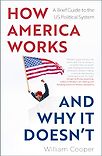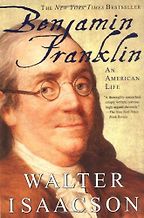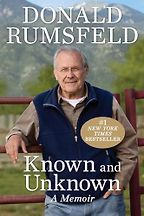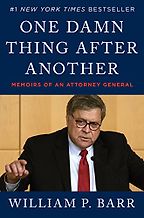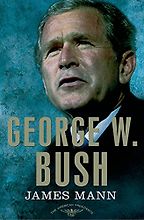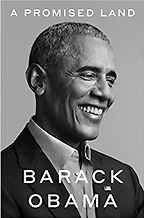Thank you for this list of political biographies from the United States. What do you look for in biography? Are you seeking to understand the bigger picture in the U.S.—a historical period or a governmental body via an individual’s story—or should a biography be more of a character study?
It’s definitely both. You can learn a lot about history through biography. For example, one of the books on my list is Donald Rumsfeld’s autobiography. He started in politics during the Eisenhower era. He was 30 years old, in 1962. He wrote this book in 2011 after he had stepped down as Secretary of Defense, so there was a solid 50 years there where he was, to varying degrees, at the center of U.S. politics.
So you can, incidentally, learn a lot about history, but I mainly look for a subject I’m really fascinated with. It’s less the time or the broad sweep of historical perspective, and more: is this person interesting?
Through Barack Obama’s book, I felt I got to know him really well. It is an autobiography, and it felt he was more candid and open than others—so that is an example of getting to know the individual more than the history.
The author of your first recommendation, Walter Isaacson, is a biographer at the top of his game. He’s written many books but you’ve chosen Benjamin Franklin: An American Life (2003). I like what the New York Times had to say about it: “In its common sense, clarity and accessibility, it is a fitting reflection of Franklin’s sly pragmatism.”
This was one of the first biographies I ever read about American politicians. I read it as an undergrad. I also read David McCullough’s biography of John Adams—another real famous biography—and they sparked my passion for politics. The Adams book traced much his life with vivid detail. He was a key founding father and America’s second president.
As you noted, Walter Isaacson’s writing is spectacular. Getting to know about Franklin through this book was very formative for me in my thinking about the subjects of history and politics.
Franklin was a true polymath: a statesman, a writer, and the inventor of—among other things—the lightning rod. What a fascinating person. Is this book what they would call a ‘cradle to grave’ autobiography? That is, does it sweep through his whole life?
It does, yes, and Isaacson is very meticulous. And, you know, he has fun. I’ve read several of his books—he has written a lot—and you can tell he’s having a ton of fun, learning about and sharing about his subjects. He picks such interesting subjects! Albert Einstein, Benjamin Franklin, Henry Kissinger… more recently, Elon Musk. He picks folks who are fascinating and really cool to learn about.
I’ve been trying to find some common thread between his subjects. It’s such a jump from Leonardo da Vinci to Steve Jobs.
And by that, I don’t just mean just some really smart people who are really successful. But more generally: I think he is fascinated by the uber intelligent folks. He probably wouldn’t write a biography of George W. Bush, for example. No offense.
Well, your second book recommendation is Donald Rumsfeld’s autobiography, Known and Unknown, a title that riffs on a famous soundbite dating from his time as Bush’s Secretary of Defense. As you say, he’s had a remarkably long career at the forefront of American politics.
Rumsfeld has always fascinated me. I’ve written about him in my columns. He was an incredibly intelligent person, in my view. I don’t know if he was quite Walter Isaacson biography level, but he was very, very smart. Very capable.
He talks a lot about this famous quote: about how there are knowns, known unknowns, and unknown unknowns. I actually think that framework is extremely insightful and helpful for thinking about things. But then—his signature endeavour in his long career was the Iraq War, which, to me, is one of history’s biggest examples of not understanding what you know and what you don’t know.
He thought there were weapons of mass destruction. He thought that the United States could go in and change Iraq. Neither one of those things were true, and it was a failure of knowledge and understanding. So that contradiction always really fascinated me.
Reading his book tapped into the curiosity. It’s a good book. It’s self-serving in a number of ways, as you might expect from an autobiography of somebody who has been very heavily criticised. But, nonetheless, it’s an interesting read.
Well I was going to ask about that. Should we understand post-retirement memoirs like this as being overt attempts to control one’s legacy?
That’s a big strain of it. It varies by individual. Some people come to autobiography with a very storng desire to ‘fix the record,’ ‘correct errors.’ Other people are more open. It depends on their personality.
I mean, it’s refreshing to read an autobiography that is heavily critical. Obama’s, for example, in contrast to Rumsfeld’s is much more self-critical, much more willing to say: ‘we got this wrong.’ Now, Obama makes arguments too, and I think a big part of his impulse is to set the record straight, historically. But you get varying degrees of that, depending on the author and their approach.
It’s much more refreshing to me to hear people try to be open and honest. And they are taking on the hardest jobs in the world—whether it is the Presidency or Secretary of State or Defense. It’s not like everything is going to go perfectly, and if you act like that’s what happened that can be revealing.
Did you come away from the Rumsfeld autobiography with more sympathy for him as a person?
Reading his book, you are reminded that he was actually very rational in a lot of ways. And he did a lot of good. I mean, when he came into his job as the Secretary of Defense, the Cold War had been over for ten years, but our general posture—where we had our troops, how we were spending our money—was still a Cold War posture.
Rumsfeld was advocating, even before September 11, was that they would have to deal with asymmetric threats like terrorism. September 11 accelerated that focus, and he was effective in a lot of ways. But then there are these contradictions that I find so fascinating: how someone so apparently smart and rational can make such big mistakes.
So, yes, I think you are reminded that this was an intelligent person trying to do their best, and sometimes you can forget that when all you see is the criticism of his biggest mistakes.
Understanding a political career is a combination of appreciating the pressures people are brought under in these roles, but also what drives them. Which in politics, to a large extent, must be personal ambition.
Yes, I think personal ambition plays a huge role in these events and circumstances. Part of why Rumsfeld wanted to go into Iraq and to transform it into a vibrant democracy was that he himself could be, along with Bush and Cheney, what finally changed the Middle East, after decade after decade of failures. I think his personal ambition to be the historical figure that solved the problem by building a democracy in Iraq, and then having democracy spread throughout the region. That was his stated goal. I think it clouded his judgement—he saw everything clearly within his field of vision, except his own self-image. That played a big role.
The third work of U.S. political biography that you’d like to recommend is William P. Barr’s One Damn Thing After Another. These are the memoirs of a man who was Attorney General twice, during two very different administrations.
Yes, Barr was Attorney General for George H. W. Bush in the early 1990s, then after being off the scene for 20 years he was hired by Donald Trump. That was the main reason I was interested in this book: the Trump years. I didn’t care a whole lot about his personal history or the first administration—not that there was anything improper in him including that. But he was at the epicenter of some of the most incredible controversies and challenges of the Trump presidency, behind the scenes when the cameras were off.
This book is subject to all the same concerns we’ve talked about—of being self-serving, trying to correct the record. That’s part of this book. But it is also really interesting, because the Trump presidency was like no other. Very different from George H. W. Bush’s, from all of them. So it was good to get a perspective from a serious knowledgeable person who was right there.
Those senior members of the Trump administration—some of whom had been politicians for a long time—must wrestle with the knowledge that their reputations have been tarnished by playing a role in the chaos of that period.
Yes, I think that’s a big factor. Barr talks in the book about how he was reluctant to join the administration. Just being associated with Trump can be a death knell for your political career. You don’t see many from the first Trump presidency involved in the prospective second Trump presidency, including his own family and the others in his administration.
Barr claims—and I think there’s a lot of truth in his claims—that he did it despite those concerns. He said: Look, I’ve been around a long time. I’m in my late sixties. Who cares if, in the last phase of my life, my reputation is not what I want it to be.
The thing I find fascinating about individuals like Barr is that, when the Trump administration was careering off the rails all the time, they wanted to step in and help. I’m a very big Trump critic; I’m not a fan of his at all. But I think a lot of his opposition went too far; they didn’t respect the office of the presidency in the way they should have, to optimise our system of government. Barr wanted the administration to succeed, even though he had doubts about Trump, and there’s a contradiction there, because he’s now blacklisted as a Trumper. Actually, I think it’s more honorable to step in and help, if you have the opportunity to do so.
I suppose so. Maybe this draws us to discuss your own new book: How America Works and Why it Doesn’t. It’s a concise overview of U.S. political institutions, post-Trump.
Thank you. Yes: here we are in the aftermath of the Trump administration, a four-year stress test of our system of government. What compelled me to write the book was that I was hopeful that we, the American polity—after his horrible behaviour surrounding the election where he tried to reverse the results—would have a reversion to the mean, a return to normality or the approach we have had as a country in the last several decades.
That didn’t happen. Trump remained Republican champion despite all his misbehaviour. The new President, Joe Biden, clearly no longer had the capacities to have the most important, demanding job in the country. I was like, okay, there’s a root cause here, something more long-term, more fundamental than just Trump in the presidency. And the effort of the book is to try to diagnose it. Why do we continue to be so dysfunctional.
You see Trump as a symptom, not the cause.
Exactly.
Well, let’s lay Trump aside for a moment. Your fourth U.S. political biography recommendation takes us back to George W. Bush. You’ve recommended a biography of the 43rd president by political journalist James Mann. The Washington Post said he “adopts an almost studied neutrality.” So this is a book for readers coming from both sides of the political divide.
You know, it’s funny. I was reading an article just this morning, by somebody very upset about the New York Times coverage of Trump. It ruffles people’s feathers when somebody is neutral about a topic they themselves are not neutral on, right? So if you are an extremist about something, even someone coming on your own side, might seem neutral. But I do think this book is a good, straightforward book. It doesn’t come with some big agenda to tear down or build up George W. Bush.
George W. Bush was a pivotal president. We had September 11 on his watch, of course, which was a big moment in our country’s history. Then the immediate response to that, where we had unity as a country: Okay, we’ve been attacked, we’re bonding together. Then we go into Afghanistan, transition into the Iraq initiative, it doesn’t go well and it tears the country apart.
In a lot of ways, there’s no precise beginning and no end. It’s all history, marching along. But there are trends underlying things, and in some ways it feels like the beginning of the fracture that we see now, where we are just so polarized.
The aftermath of the Iraq War hardened and accelerated America’s dysfunction and partisanship, and it just keeps getting worse. Then Obama inflamed it because he angered a lot of people. A lot of the country wasn’t ready for him to be president, and then, of course, Trump turbocharged it.
Right, that’s an interesting point about the passage of history. Reading history books, especially modern history, one gets the sense of this constant, semi-chaotic stream of events which carries us helplessly along. Does the political biography allow us to understand that great personalities or great minds have the power to be the rocks that alter the flow?
It’s a mix. Some things are just so out of anybody’s control. And beyond that, there are large trends or surprising shocks. No matter what you do, no matter who you are, the world is an enormous place. Whether you are the president of the United States or the king of a small country in Eastern Europe, history is going to happen. But there are moments and opportunities where individuals can play a real role, and the decision-making is extremely decisive and important.
So it’s a mix, and that’s what makes it such a dynamic place, history. You get both.
Political biographies offer us some kind of insight into the rooms where decisions are made in the U.S., and foreground the known, controllable elements.
And it’s really fun to read them. Obama’s book in particular I enjoyed. He lays it all out. It’s not perfect—he has the same mixture of motivations that they all do—but it’s really nice to hear what he was thinking. This is his perspective from behind closed doors, for all these events I was watching from the outside.
Yes, let’s talk a bit more about A Promised Land, the first volume of Barack Obama’s presidential memoirs, which is the last of the U.S. political biography books you’d like to recommend. Forgive me my British ignorance, but I hadn’t realised this was such a tradition—a whole sub-genre of biography, the presidential memoir.
It’s a big thing! Biden probably already has a literary agent lining things up right now. The critics often say: You’re just doing that so it can be in your memoir. As you say, it’s a big tradition. Every single president, to my knowledge—at least in the last several decades—have done it. We all know it’s coming. And in general, you know, they do a good job. I think they want to add to the discussion; they are an important source for historians.
Churchill’s writing, of course, is famous for being an important historical document, and I think he set a standard for what a U.S. president can do in writing about their experiences.
Trump is an outlier in many ways, so maybe he will break this tradition too. But I doubt it. It’s a big moneymaker! So I think that, at the very least, will get him playing the game. It forms a big part of the literary scene in the U.S. and certainly part of creating the historical record.
Of course, Obama is proven as an author. His earlier memoirs were a huge success, so we know he can write well.
Absolutely. I’m sure he gets a lot of help with editors and contributors, but the book is in his own voice. He’s a really smart person, was the president of the Harvard Law Review—probably the most prestigious role for a student in the American legal academy—and very, very, literate, whether you agree with his politics or not.
George W. Bush’s memoirs, although I’ve not included it on this list, was also in his own voice, in a different way. And that was refreshing too. You can tell they didn’t just have somebody else, who articulates themselves differently, write the books. It’s refreshing. And I found Obama’s, particularly, to be a great read, really enjoyable.
Have you read Michelle Obama’s book, Becoming, too?
I have. I love that book—it’s a great, great book. They must have been writing them at roughly the same, just after Obama left office, and they kind of go together. You can tell they were talking to each other about what they were writing—a) to be consistent, but also b) to complement each other.
Michelle Obama’s perspective, both as First Lady and just as a really smart person who was right in the middle of all of it—is really insightful, enriching, and refreshing.
Actually, maybe that prompts me to ask another, final question. This is quite a male-heavy list. Along with Michelle Obama’s, are there any other books by female authors or on women subjects that merit special mention?
Yes, thank you. I’d like to mention Hillary Clinton’s books. She writes both fiction and nonfiction, and is a fascinating historical figure in herself. She has a great perspective.
Sometimes biographers and journalists do a great job, but they weren’t actually in the room. They don’t have a perspective that is hardened and chiseled by experience. Hillary Clinton, if you look at her background, is unbelievable. I mean, she was First Lady for Bill Clinton, but did a lot of real work. She testified before Congress, contributed in some phenomenal ways. Then she was a senator, and by all accounts did a great job. She won reelection, was Secretary of State for Obama, was very respected. Then, of course, she has the experience of running against Trump.
So I recommend all her books— she’s written so many I don’t know which one to pick out. Maybe What Happened?, about the election with Trump. But there are several and she brings a great perspective.
Interview by Cal Flyn, Deputy Editor
September 24, 2024. Updated: September 30, 2024
Five Books aims to keep its book recommendations and interviews up to date. If you are the interviewee and would like to update your choice of books (or even just what you say about them) please email us at [email protected]
Five Books interviews are expensive to produce. If you've enjoyed this interview, please support us by donating a small amount.

